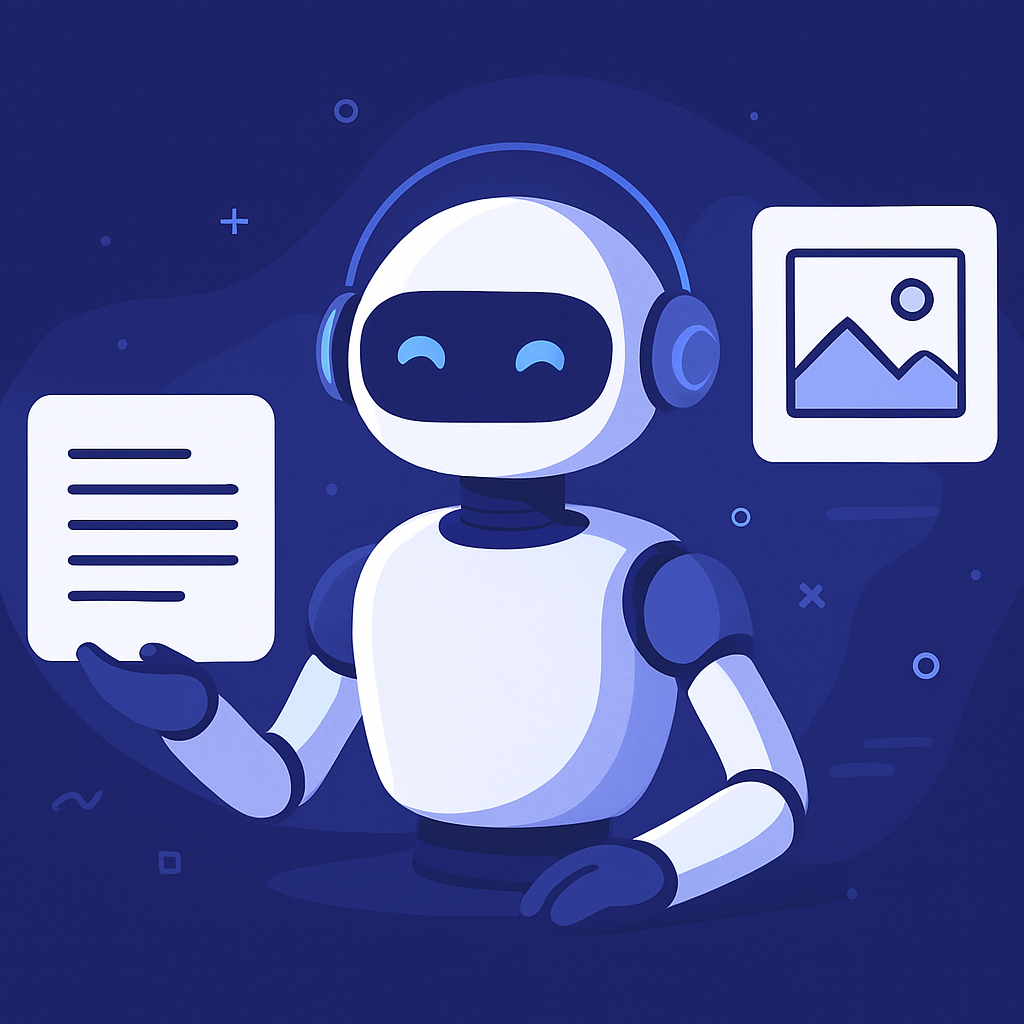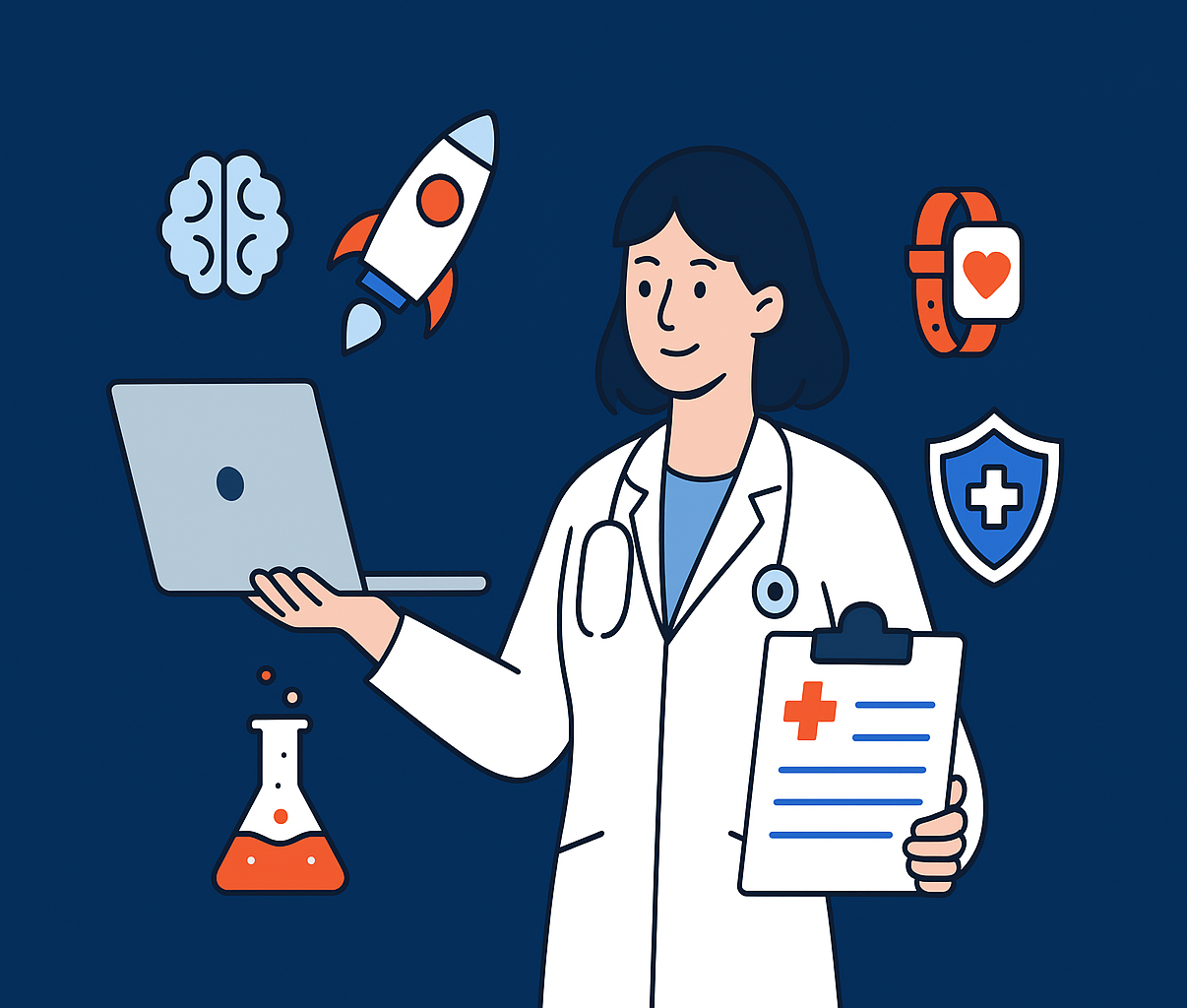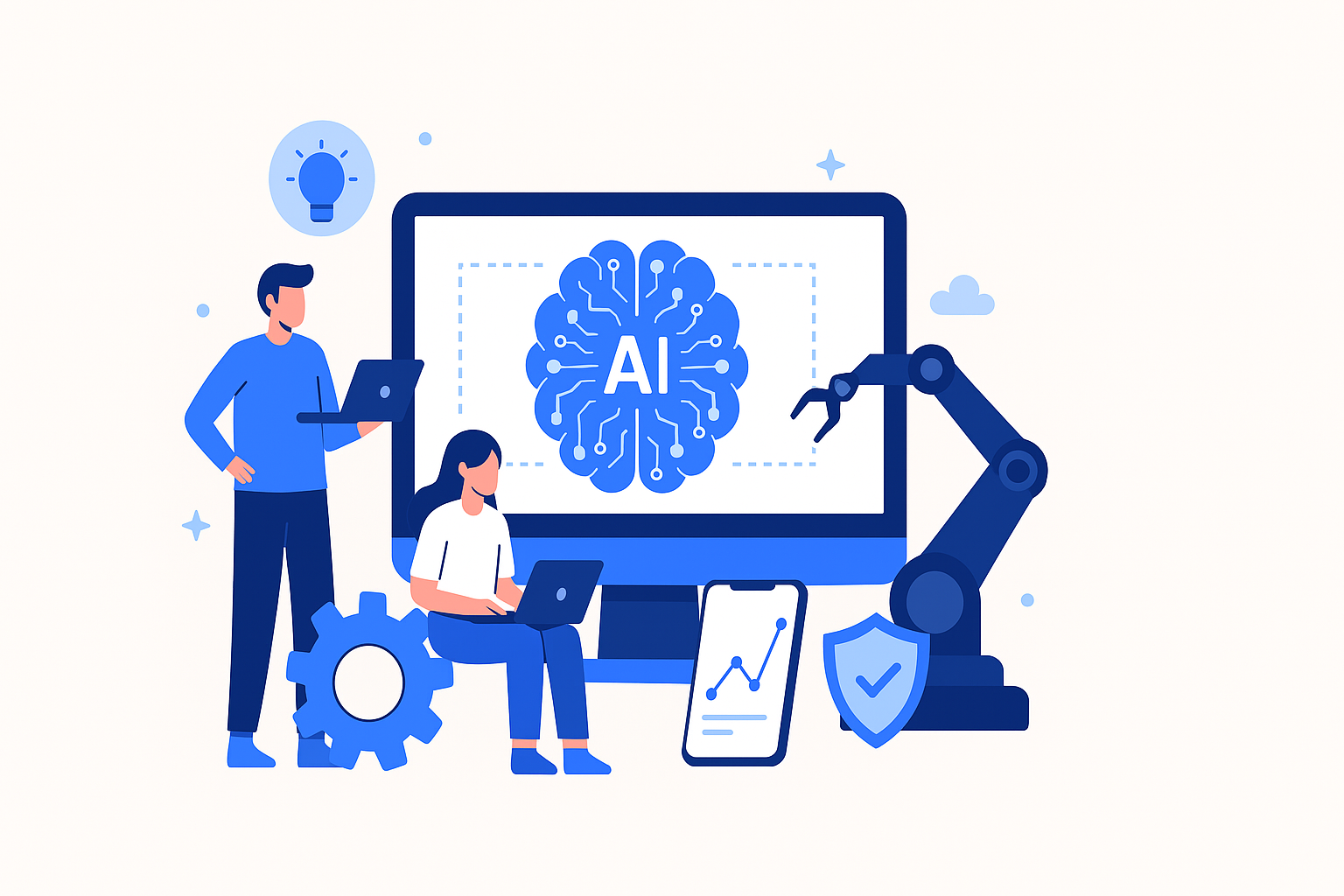Generative artificial intelligence (AI) is changing the game in many industries, and education is no exception. This powerful technology is reshaping how we learn and teach, offering tools that make education more personalized and effective. As reported by HolonIQ, the global ed-tech market is projected to hit $404 billion by 2025, mostly thanks to advancements in AI.
Imagine a classroom where you get learning materials that fit you like a glove. Thanks to generative AI, this vision is becoming a reality. AI can whip up customized study guides, interactive lessons, and even real-time feedback that helps both students and educators. This tailor-made approach is not just a theoretical possibility—it’s already boosting educational outcomes by catering to diverse learning styles.
Yet, here we face a big problem. Issues such as data privacy, algorithmic bias, and academic integrity are critical concerns we have to deal with. For instance, securing student data and ensuring AI tools are used ethically are essential to maintaining trust and fairness in education.
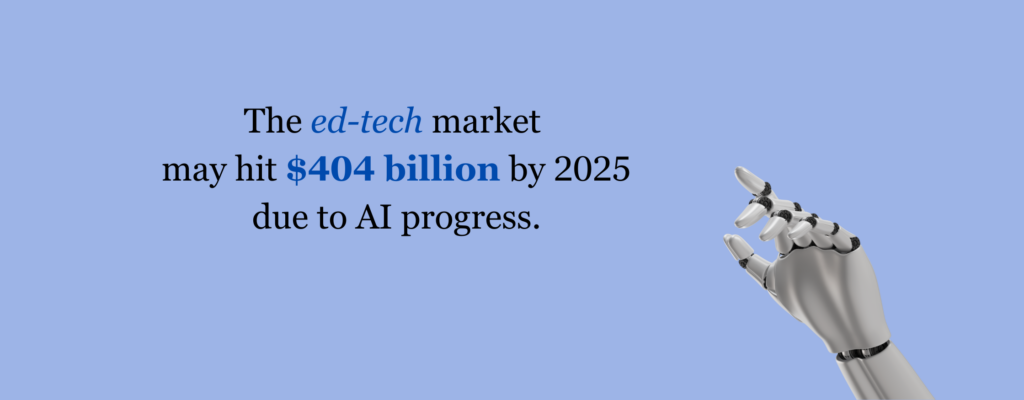
In this article, we’ll dive into how AI is changing education—the good and tricky parts. We’ll also examine how AI can aid students with disabilities, making learning more accessible. Plus, we’ll spotlight innovative startups pushing the boundaries in ed-tech and consider what the future holds for AI in education.
Join us as we delve into the exciting world of generative AI in education, uncovering its promise and the responsibilities that come with it.
The AI’s Impact on Education
Generative AI is making waves in education, thanks to deep learning and machine learning (ML), fundamentally altering how students learn and how educators teach. It lets us make learning experiences that are tailored to each student. These AI algorithms can look at tons of educational data to create quizzes, lessons, and feedback that fit each student’s needs.
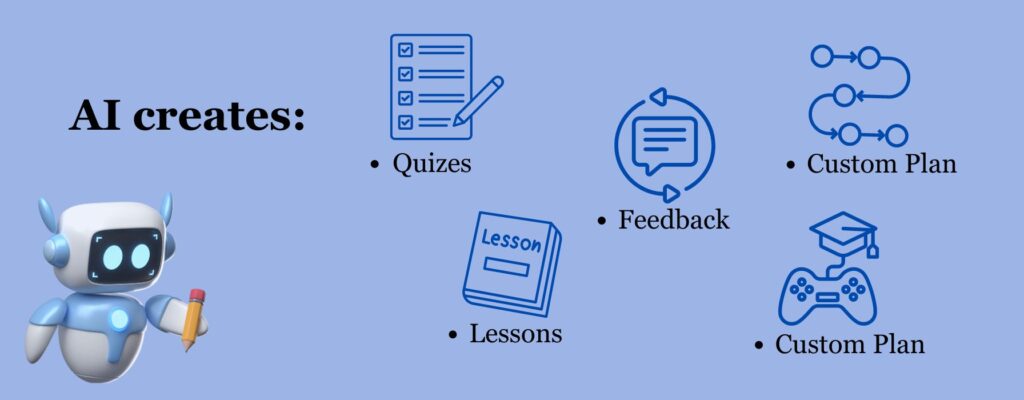
This tech doesn’t just make learning more fun. It also helps teachers find areas where students are struggling and offer help, making education more efficient and available to all. Machine learning further enhances this process by continuously improving the AI’s ability to adapt and predict student performance, making education more efficient and engaging. As AI keeps improving, it will be a key player in changing how we teach and learn. By the way, to learn more about deep learning and its future, read our article.
Generative AI’s impact on education is broad, touching on various aspects of the educational experience. Find out how below.
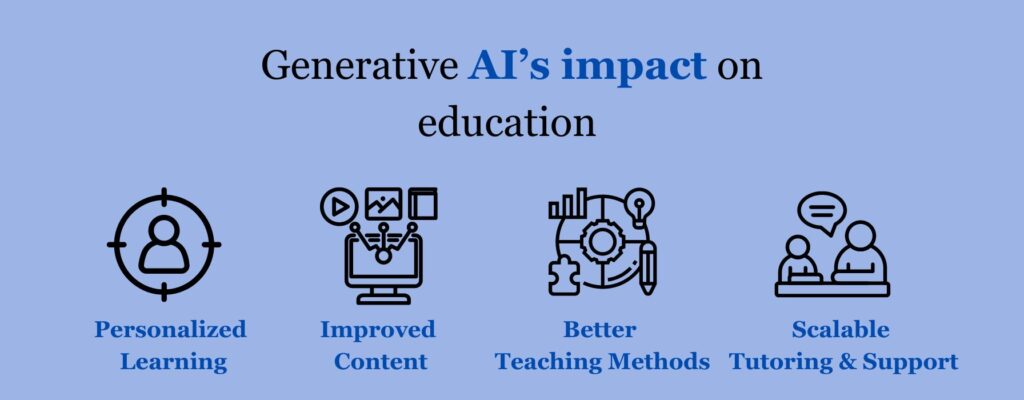
Personalized Learning
Generative AI in education makes it possible to create customized learning experiences. Traditional education often follows a one-size-fits-all approach, which means some students get left behind while others zoom ahead. But AI changes that. It can tailor learning materials to fit each student’s unique needs and pace.
For example, platforms like DreamBox and Knewton use AI to adjust lesson difficulty on the fly. This means that students receive content that is just right for their current skill level, keeping them engaged and motivated. Research by McKinsey & Company shows that personalized learning can significantly improve student performance—up to a 30% increase in academic achievement and a 60% boost in student engagement.
Enhanced Educational Content
Generative AI also excels in creating educational content that is engaging and interactive. AI-driven tools can generate a variety of learning materials, including practice exercises, quizzes, and even multimedia resources like videos and simulations. This capability not only enriches the learning experience—it also saves teachers a ton of time and effort.
Take platforms like Content Technologies and Carnegie Learning, for example. They use AI to create custom textbooks and learning aids that adapt to students’ needs. This means students get relevant and up-to-date info. By handling content creation, AI lets teachers focus on teaching instead of admin tasks.
Improved Teaching Methods
AI’s impact extends beyond student learning to include improvements in teaching methods. With AI-powered tools, educators can plan better lessons, track student progress, and give more helpful feedback. Take student data, for instance. AI can analyze it to find areas where students struggle and suggest ways to help them catch up.
Tools like IBM’s Watson Education give teachers a closer look at how their students are doing and help them create more effective lesson plans. These systems can also provide real-time feedback on student assignments so educators can tackle these issues promptly and adjust their teaching strategies as needed.
Scalable Tutoring and Support
AI-powered tutoring is another huge plus. It lets students get help anytime, not just during regular class hours. These systems use natural language to understand and respond to students’ questions, offering explanations and guidance on lots of different topics.
Take Squirrel AI and Khan Academy’s AI tutor, for instance. They provide personalized tutoring sessions that adapt to each student’s style and progress. This means students can get the support they need, no matter where they are or the time of day.
In short, generative AI in education makes learning more personal, improves teaching methods, and provides support that scales. As these technologies keep getting better, they’ll make education more effective, engaging, and accessible to all students. However, we should also consider the ethics of using AI in education.
What are Some Ethical Considerations When Using Generative AI in Education?
As AI becomes more prevalent in education, we must focus on ethics. This way, we ensure it helps all students and doesn’t cause problems. Here are some significant issues and how they affect learning.
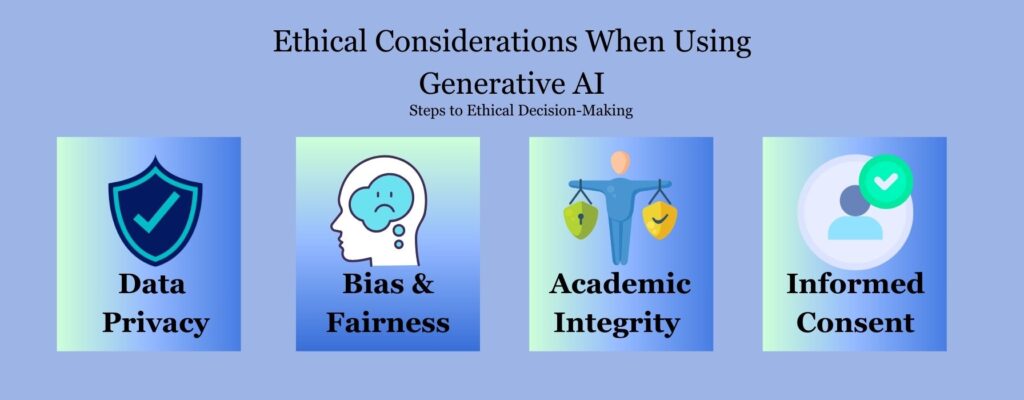
Data Privacy and Security
When we bring AI into education, a major concern is keeping student data private and secure. Indeed, these systems often rely on vast amounts of data to function effectively, including sensitive information about students. And sadly, many educational institutions face challenges in ensuring the security of student data when using AI technologies.
So, how do we fix this? First, we must make sure schools follow the rules, like FERPA in the US and GDPR in Europe. Then, they need to get serious about security and have clear plans for managing data. If we do that, we can reduce risks and protect our students’ personal info.
Bias and Fairness
Here’s the thing: AI algorithms can be biased, and it’s a big deal. AI systems learn from existing data. If this data contains biases, the AI can inadvertently perpetuate these biases. A study by the MIT Media Lab found that some AI-powered educational tools can exhibit racial and gender biases, which affect the fairness of the learning experience.
So, what can we do? We must ensure the data we use to train AI is diverse and fair. We also need to check the AI regularly for biases and update it to fix any problems. By prioritizing fairness and inclusivity, educational institutions can help ensure that AI tools provide equitable learning opportunities for all students.
Academic Integrity
AI’s role in generating educational content has a dark side: it’s putting academic integrity at risk. With the ability to churn out essays, solve problems, and even simulate test answers, it’s no wonder some students are tempted to take the easy way out. Case in point: a survey by the Center for Academic Integrity found that 40% of students have used AI tools to assist with academic assignments in ways that could be considered dishonest.
To address these concerns, educational institutions must draw a clear line in the sand. They should set strict guidelines for AI use, and educators should drill into students the importance of original work. By fostering a culture of integrity, schools can maintain the value of educational achievements and ensure that AI is used ethically.
Informed Consent
Students, parents, and educators should be fully aware of how AI tools are used and their potential implications. Transparency about data usage, the nature of AI interactions, and the goals of AI applications help build trust and ensure that all stakeholders are comfortable with the technology.
Educational institutions should provide clear information about AI tools and obtain consent before implementation. This way, we respect privacy and make smart choices together—teachers, students, and tech providers working as a team.
How to Use AI Ethically in Education
Navigating generative AI in education isn’t just about dealing with problems—we need to take charge and make sure AI is used in a way that’s both responsible and effective. So, how can schools and stakeholders use AI to improve learning while still being fair and honest?
Here’s how educational institutions and stakeholders can use AI ethically to enhance learning while upholding high standards of integrity and fairness:
|
Ethical Consideration |
Key Actions |
Details |
|
Transparency and Accountability |
– Document AI use – Open Dialogue – Monitor Systems |
– Share AI details – Discuss AI use openly – Track and address issues |
|
Informed Consent |
– Inform Stakeholders – Obtain Approval – Update Policies |
– Explain AI tools and risks – Get consent before use – Revise as needed |
|
Collaboration and Improvement |
– Collaborate with Experts – Collect Feedback – Review Tools |
– Partner with AI and education experts – Gather input from users – Continuously improve tools |
|
Ethical AI Design |
– Minimize Bias – Protect Privacy – Ensure Inclusivity |
– Use diverse data – Secure data properly – Design for all students |
Transparency and Accountability
Transparency is key to the ethical use of AI in education. Schools and educational technology providers should be open about how AI systems work, including their data sources, decision-making processes, and potential biases. According to a study by the UKG, 78% of educators believe that transparency in AI tools is crucial for maintaining trust and ensuring effective use in the classroom.
So, how can schools promote transparency? Here are some ideas:
-
Provide Detailed Documentation: Share info about AI algorithms, data use, and privacy policies with students, parents, and teachers.
-
Engage in Open Dialogue: Talk openly about how AI tools are used and their pros and cons.
-
Establish Accountability Measures: Set up ways to monitor AI systems and fix any problems that arise.
Informed Consent
Getting consent from everyone involved is crucial when we bring AI into schools. Students, parents, and teachers need to know how AI will be used, what data will be collected, and how it will be kept safe. A survey by the National University showed that 80% of parents worry about AI invading their kids’ privacy, so educators and ed-tech providers need to be upfront and honest.
To make sure everyone’s on the same page, schools should:
-
Provide Clear Information: Offer detailed explanations about the AI tools, including their purpose, data handling practices, and potential risks of AI in education.
-
Obtain Consent: Ask students and parents for their explicit permission before using AI tools.
-
Update Consent Policies: Regularly review and update consent practices as AI technology and data regulations evolve.
Collaboration and Continuous Improvement
We need educators, technologists, and policymakers to work together to use AI in a fair and beneficial way. By teaming up, we can tackle the challenges that arise and make AI tools that really better service educational goals.
To make this happen, it’s needed to:
-
Partnering with Experts: Work with AI specialists, data scientists, and educational researchers to develop and improve AI tools.
-
Gathering Feedback: Ask educators, students, and parents what they think to identify what needs to be improved and make sure AI tools are meeting real needs in education.
-
Monitoring and Adapting: Regularly assess the performance of AI tools and make necessary adjustments based on feedback and new insights.
Ethical AI Design
Designing AI systems with ethical considerations in mind is a must. We need to make sure they function fairly and responsibly. AI developers should focus on creating systems that are inclusive, unbiased, and respectful of user privacy.
Key aspects of ethical AI design include:
-
Bias Mitigation: Use diverse datasets and employ techniques to minimize biases in AI algorithms.
-
Privacy Protection: Implement strong data protection measures and limit data collection to what is necessary for the AI’s function.
-
Inclusivity: Design AI tools that accommodate the needs of all students, including those with disabilities or from diverse backgrounds.
AI for Students with Disabilities
Generative AI is changing the game for students with disabilities by making education more inclusive. It’s doing this by catering to their unique needs. Here’s how AI improves access to education and supports students with various challenges.
Accessibility and Assistive Technologies
AI-driven assistive technologies are transforming how students with disabilities engage with educational content. These tools provide tailored support to enable students to overcome barriers and participate more fully in learning activities.
-
Speech-to-Text and Text-to-Speech: Tools like Google’s Live Transcribe and Microsoft’s Immersive Reader help students with hearing impairments and reading difficulties. They convert spoken words into text or read text aloud. For example, students with dyslexia can understand and participate more in class thanks to these tools.
-
AI-Powered Navigation: For students with visual impairments, AI technologies like Seeing AI and Aira offer real-time assistance by describing surroundings and reading text. These tools improve independence and ease of navigation within educational settings.
Customizable Learning Aids
Generative AI enables the creation of customizable learning aids that adapt to individual needs, making education more accessible and personalized.
-
Adaptive Content: AI systems can change the difficulty and style of learning materials based on a student’s specific requirements. For example, platforms like Ghotit use AI to provide tailored writing assistance for students with dyslexia and other learning disabilities.
-
Interactive Learning Tools: AI can create interactive simulations and games for different learning styles and abilities. These tools, like those from Cognii, offer personalized feedback and adapt content to meet individual learning goals.
Noteworthy Generative AI Education Startups
Generative AI is fueling innovation in the education sector, leading to the rise of numerous startups that are transforming how learning is delivered and experienced. Let’s take a peek at some top startups using AI to revolutionize education tech:
Overview of Prominent Startups
Several startups are at the forefront of integrating generative AI into educational tools, each focusing on different aspects of learning and teaching:
-
Squirrel AI: Known for its adaptive learning technology, Squirrel AI uses AI to create customized lesson plans for students. The platform adjusts the content and difficulty in real time based on how well students are doing and how they learn. This approach helps students learn as much as possible, and thousands of schools in China are already using it.
-
Content Technologies: This startup focuses on automating the creation of educational content. Using AI, Content Technologies generates customized textbooks and learning materials tailored to specific curricula and student needs. Their tools help educators save time on material preparation and offer students resources more aligned with their learning goals.
-
Knewton: Knewton offers an adaptive learning platform that uses AI to analyze student data and provide personalized recommendations. By integrating AI with educational content, Knewton helps students focus on areas where they need improvement, facilitating a more efficient learning process.
Innovations and Solutions
Generative AI startups are developing a range of innovative solutions that enhance the learning experience:
-
Interactive Learning Modules: Startups like Cognii are creating AI-powered educational games and interactive modules that adapt to individual learning styles. These tools offer personalized feedback and dynamically adjust content based on student interactions, making learning more engaging and effective.
-
Automated Tutoring Systems: Platforms like Jill Watson use AI to provide real-time tutoring and support. Originally developed for use in higher education, Jill Watson’s AI system helps answer student queries and facilitate discussions, simulating the presence of a teaching assistant.
-
Content Generation: Companies like AI Dungeon are using generative AI to create immersive and interactive educational experiences. By generating narratives and scenarios based on user input, these tools make learning more interactive and enjoyable.
Challenges and Future Outlook
Despite their innovations, generative AI education startups face several challenges:
-
Scalability: A significant hurdle is ensuring that AI tools can scale effectively across diverse educational environments and varying student needs. Startups must balance customization with broad applicability to reach a wide audience.
-
Data Privacy: As with all AI applications, protecting student data and ensuring compliance with privacy regulations is critical. Startups must implement robust data security measures and transparent practices to maintain trust.
How We Can Help You Build Cutting-Edge GenAI Ed-Tech Software
At LITSLINK, we specialize in developing innovative generative AI solutions for the Ed-Tech sector. Here’s how we can support you:
Custom AI Solutions
-
Tailored Development: We create bespoke AI tools for personalized learning, adaptive content, and interactive experiences based on your specific needs.
-
Adaptive Engines: Our AI systems adjust in real time to enhance student engagement and outcomes.
Expert Consultation
-
Integration Strategy: We guide you through integrating AI into your educational framework smoothly and effectively.
-
Ethical Practices: We ensure your software adheres to data privacy, transparency, and fairness standards.
User Experience
-
Intuitive Design: We design user-friendly interfaces that are engaging and easy to navigate for both students and educators.
-
Feedback-Based Improvements: We use user feedback to refine and optimize your platform.
Support and Maintenance
-
Ongoing Support: We offer technical support and maintenance to keep your software running smoothly.
-
Continuous Updates: We ensure your platform stays current with the latest AI advancements and educational practices.
Proven Expertise
-
Successful Projects: Our track record includes successful collaborations with educational institutions and startups, showcasing our ability to deliver impactful AI solutions.
Partner with us to create transformative GenAI Ed-Tech software that enhances learning and leads the industry.
Takeaways
Generative AI is changing the education game, offering transformative possibilities that promise to enhance learning experiences, personalize education, and increase accessibility. AI’s impact spans personalized learning, enriched educational content, improved teaching methods, and scalable support. However, with these advancements come important ethical considerations, including data privacy, bias, and academic integrity, which must be addressed to ensure responsible AI use.
The possibilities of generative AI in education are endless—from helping students with disabilities to inspiring new startups, even AI can be used in medical education. As these technologies get better, they can create more engaging, inclusive, and effective learning environments.
At LITSLINK, we are committed to helping you harness the power of generative AI to build cutting-edge educational tools. With our expertise in custom AI solutions, strategic consultation, user-centric design, and ongoing support, we can turn your vision into reality. Together, we can advance education technology and make a lasting impact on students and educators worldwide.
Let’s shape the future of education with generative AI and make learning more innovative and inclusive. Reach out to us today!
FAQ
How does generative AI handle different learning styles?
Generative AI can adapt learning materials and experiences to suit various learning styles by analyzing student data and tailoring content accordingly, providing a personalized approach to each student’s preferences.
What are the costs associated with integrating generative AI into educational systems?
Costs can vary widely depending on the complexity of the AI solution, the scale of implementation, and ongoing maintenance. It’s best to consult a provider for a detailed cost analysis based on your needs.
How do AI tools ensure they remain compliant with evolving data privacy regulations?
AI tools stay compliant by implementing robust data protection measures, regularly updating their privacy policies, and adhering to regulations like GDPR and FERPA. Providers typically conduct periodic audits to ensure ongoing compliance.
Can generative AI be used effectively in both K-12 and higher education settings?
Yes, generative AI is versatile and can be adapted for K-12 and higher education settings. The technology can be tailored to meet the different needs and complexities of various educational levels.
How do you measure the effectiveness of generative AI tools in improving educational outcomes?
Effectiveness is measured through various metrics, including student performance data, engagement levels, and feedback from users. Schools often conduct assessments and analyses to evaluate how well the AI tools support learning objectives.


